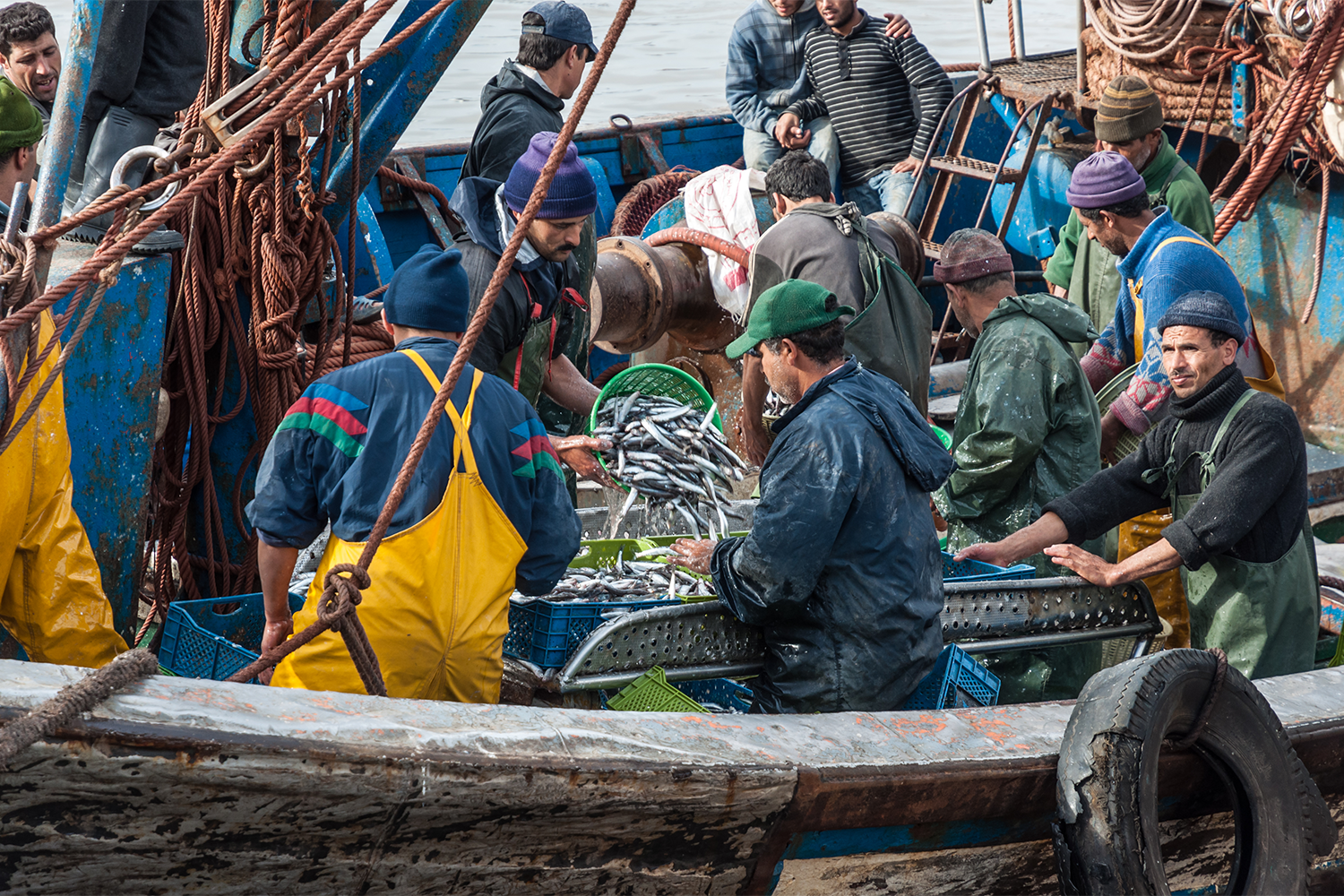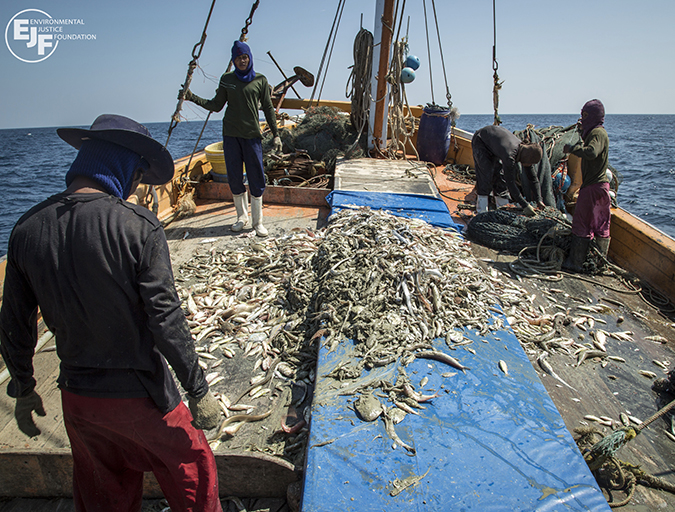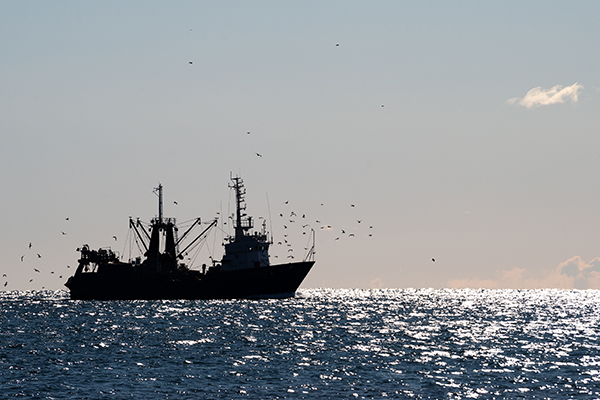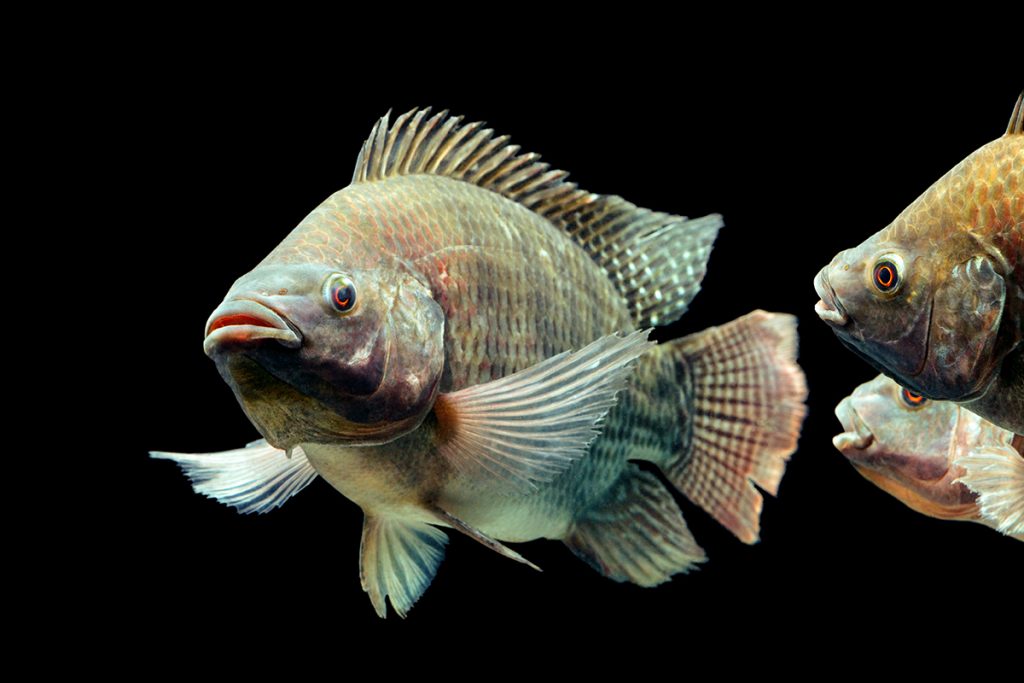FTC: Forced labor and fisher abuse is prevalent in European and Chinese fishing operations, fueled by a lack of transparency

Forced labor is a growing problem onboard commercial fishing vessels around the world and a major overlapping contributor to illegal, unreported and unregulated fishing (IUU fishing) practices, warned a recent report by the Financial Transparency Coalition (FTC). Moreover, this group of 11 NGOs – including Transparency International, Global Financial Integrity and the Tax Justice Network – found little or no effort from many countries to root out the companies and individuals responsible.
FTC’s report, entitled “Dark Webs: Uncovering Those Behind Forced Labor on Fishing Fleets,” follows on from an IUU fishing study it published in 2022, with the latest analysis learning that one in four industrial and semi-industrial fishing vessels accused of forced labor were owned by European companies, and a quarter were flagged to China.
To establish the scale of the problem, FTC created a database of nearly 1,500 commercial vessels accused of involvement in forced labor and IUU fishing activities; 475 of these were involved in human rights abuses.
Unsurprisingly, FTC ascertained a crossover, whereby some vessels accused of forced labor were also engaging in IUU fishing, and that many of these utilize secrecy jurisdictions to hide their legal and beneficial owners. It was also found operators take advantage of the vast and often ungoverned high seas, as well as the lack of monitoring and surveillance capacity of global south countries in particular, where the majority of violations and related illicit financial flows seem to take place.
The report determined that companies from just five countries – China, Taiwan, Thailand, South Korea and Spain – own almost two-thirds of the accused vessels for which legal ownership data is available. FTC also found the owners of these vessels mostly hide behind complex, cross-jurisdictional corporate structures ranging from shell companies to opaque joint ventures, and it pointed out that ownership information is rarely requested by most countries when registering vessels or requesting fishing licenses. This, in turn, means those who are ultimately responsible for the abuses aren’t detected or punished.
In efforts to enhance transparency in fisheries, the ultimate beneficial owner comes into focus
Of the top 10 companies owning vessels accused of forced labor, seven were from China, two were from South Korea and one was from Russia. Chinese company ZheJiang Hairong Ocean Fisheries Co. Ltd. topped the ranking with 10 of its vessels accused of labor and human rights violations, including deception, withheld wages, abusive living and working conditions and debt bondage.
In total, 22.5 percent of commercial fishing vessels accused of forced labor were owned by European companies. Spain led this list with 12 vessels (representing 5 percent of the total for which legal information is available), followed by Russia (7 vessels) and the UK (6 vessels). Spanish vessels also represented almost one-quarter of European vessels accused of forced labor, Russian vessels 14 percent of the total and the UK 12 percent.
Lead author Alfonso Daniels told the Advocate it was surprising how many European companies were involved in forced labor, with FTC’s project able to identify around half of the 41 vessels’ legal owners.
“The fact that almost a quarter of them were European, especially from Spain, the UK and Ireland – countries that you would never think would be so high up on this issue,” said Daniels.
FTC’s report also builds on recent estimates from the UN International Labor Organization (ILO) that more than 128,000 fishers were trapped in forced labor aboard fishing vessels in 2021 – suffering abuses that ranged from physical violence and debt bondage to abusive working conditions, with the fishers at risk mainly coming from global south regions like Southeast Asia and Africa.
Study indicates that IUU fishing makes fishers’ jobs even more dangerous
Political will is a key
While his analysis focused on finding the companies involved, Daniels acknowledged that forced abuse on commercial fishing vessels is widespread, and that from conversations with trade union bodies, the actual number of people in these situations could perhaps be five times greater.
The report also stated that more than 40 percent of industrial and semi-industrial fishing vessels accused of forced labor operated in Asia, followed by Africa (21 percent), Europe (14 percent) and the Latin America-Caribbean (LAC) region (11 percent), while Indonesia emerged as the “global hotspot” for forced labor cases, with nearly one-fourth of detected vessels operating in its waters. In total, 45 percent of the accused vessels operated in just five countries: Indonesia, Ireland, Uruguay, Somalia and Thailand.
According to Daniels, financial secrecy continues to surround the fishing sector and there appears to be little political will to improve financial transparency needed to pinpoint those responsible. With the sector seemingly getting to be even more secretive, he said, it was important for FTC to extend into the area of human rights to help the environmental sector realize that financial issues are another key element to tackling environmental crimes.
To protect fishers and enhance transparency in the sector, FTC suggests five key measures moving forward:
- Improve publicly available vessel information so that before awarding a fishing license or authorization, flag and coastal states require information on the managers, operators and beneficial owners of the vessel. Additionally, unified and publicly available lists of vessels accused of forced labor and IUU fishing should be created.
- Create publicly accessible beneficial ownership registries so that states can pursue those who are profiting from natural resource crimes and forced labor.
- Identify forced labor and IUU fishing as “predicate offences” for money laundering purposes.
- Ratify key international fisheries treaties and conventions to prevent forced labor and IUU fishing, including the ILO’s Work in Fishing Convention of 2007, which seeks to ensure fishers have decent conditions of work onboard fishing vessels (ratified by 21 countries to date), and the Cape Town Agreement of 2012.
- Include fisheries as an extractive industry in key initiatives, including the Extractives Industry Transparency Initiative (EITI), and others concerning regulation and transparency of extractive industries.
Collectively, these suggested measures will facilitate greater knowledge of the vessels involved in both forced labor and IUU fishing, Daniels said.
“Without that, we won’t know what we’re searching for. At the moment, that doesn’t exist; we had to build our database of forced labor from scratch – some 500 vessels – and that’s the largest in the world,” he said. “Then, once we have that, we need to build the beneficial ownership information for all those vessels, and that has to be made publicly available to all jurisdictions.”
A legal framework, including penalties, also needs to be in place to deal with these labor-abuses and violations, he said: “The key thing is these measures are not hard to implement; they won’t require much effort. It really is a lack of political will that has held everything back.”
In this regard, some modest but sporadic progress has been made, with Daniels acknowledging the U.S. government has put greater emphasis on fighting forced labor in commercial fishing fleets in recent times. An example of this, he said, was the U.S. Treasury sanctioning the two Chinese-owned companies – Dalian Ocean Fishing Co. Ltd. And Pingtan Marine Enterprise Ltd. – and their beneficial owners, both of which appear on FTC’s top 10 IUU fishing and forced labor lists.
At the same time, the EU is proposing banning products derived from forced labor from entering and being consumed in the European market.
“That’s promising – especially given the large contingent of European companies behind forced labor,” he said. “There are some green shoots here and there, but overall, there’s still very little happening.”
The overriding hope is the report will spark more action, and lead to the companies responsible being properly investigated, Daniels said.
Change could also come, he suggested, from the G7 and the seafood markets of the European Union, the United States and Japan: “In my opinion, if they could set up very clear rules on what you can and cannot do, what kinds of products you can import, etc. – that opens up the opportunity for change.”
It really is a lack of political will that has held everything back.
European pilot launched
The New Year has brought further promise of progress, with the announcement of a new worker-driven pilot program aimed at fighting worker exploitation in the U.K. fishing industry.
The Worker-Driven Social Responsibility (WSR) program, billed as the first of its kind in Europe, is a collaborative effort by Focus on Labour Exploitation (FLEX), the International Transport Workers Federation (ITF) and the Fair Food Program (FFP). After a 12-month planning phase, the program has evolved into a two-year project funded by Humanity United. The aim is to create mechanisms and systems driven by workers and enforced by the market. These measures are designed to improve working conditions and tackle concerns related to labor abuse.
Building on the successes of existing global WSR programs like the U.S.-based Fair Food Program (2011) and the 2013 Bangladesh Accord, the U.K. WSR fishing pilot program will collaborate with the Scottish White Fish Producers Association (SWFPA) and industry partners. The focus is on addressing concerns, including issues arising from the immigration loophole in the seafarer’s transit visa. This loophole leaves migrant fishers without protection under U.K. employment laws when working on U.K. vessels just beyond the 12-nautical-mile legal limit.
With the U.K. Home Office admitting in 2023 that transit visas used for crew fishing in U.K. territorial waters are an illegal route to employment, ITF fisheries expert Chris Williams said the new pilot project gives migrant fishers working on some of these vessels “a chance for greater protection and improved conditions at work,” as well as the ability to shape their own working conditions, despite the continued use of seafarer’s transit visa to recruit them.
“We hope this pilot will be successful and expand over time to ensure all workers, regardless of their nationality or immigration status, are paid fairly and treated with respect for the difficult work they do,” Williams said.
The pilot program will be launched in Northeast Scotland, delivered by FLEX in partnership with the Coalition of Immokalee Workers (CIW), and in consultation with ITF, the Fair Food Standards Council and Dr. Jess Sparks, assistant professor at the Friedman School of Nutrition Science and Policy at Tufts University.
“For too long, the global fishing industry has relied on voluntary standards and initiatives that demonstrably cause further harm to workers,” said Sparks. “WSR has more than 10 years of evidence supporting its effectiveness in eliminating all forms of labor exploitation, and I’m excited to see U.K. fisheries be world-leading in implementing the first WSR program in fishing.”
Now that you've reached the end of the article ...
… please consider supporting GSA’s mission to advance responsible seafood practices through education, advocacy and third-party assurances. The Advocate aims to document the evolution of responsible seafood practices and share the expansive knowledge of our vast network of contributors.
By becoming a Global Seafood Alliance member, you’re ensuring that all of the pre-competitive work we do through member benefits, resources and events can continue. Individual membership costs just $50 a year.
Not a GSA member? Join us.
Author
-

Jason Holland
Jason Holland is a London-based writer for the international seafood, aquaculture and fisheries sectors. Jason has accrued more than 25 years’ experience as a B2B journalist, editor and communications consultant – a career that has taken him all over the world. He believes he found his true professional calling in 2004 when he started documenting the many facets of the international seafood industry, and particularly those enterprises and individuals bringing change to it.
Related Posts

Responsibility
Intelligence, integrity in the fight against forced labor in seafood
In previewing the SeaWeb Seafood Summit, the Advocate examines human rights in the supply chain and the people who advance solutions in rooting out worker abuses. In part one of a three-part series, Environmental Justice Foundation co-founder Steve Trent talks about linking environmental security with human rights.

Fisheries
Global analysis of where fishing vessel tracking devices are disabled provides insights into IUU fishing
A new dataset of intentional disabling of identification devices by fishing vessels provides new insights into IUU fishing activities.

Aquafeeds
World’s largest fly factory attracting investors eyeing aquafeed expansion
A high-capacity black soldier fly factory puts Protix in position to ramp up production. Investors explain why they’re betting on the sector’s success.

Health & Welfare
‘The right thing to do’: How aquaculture is innovating to reduce fish stress and improve animal welfare
With research showing that stress can damage meat quality, fish and shrimp farmers are weighing the latest animal welfare solutions.


